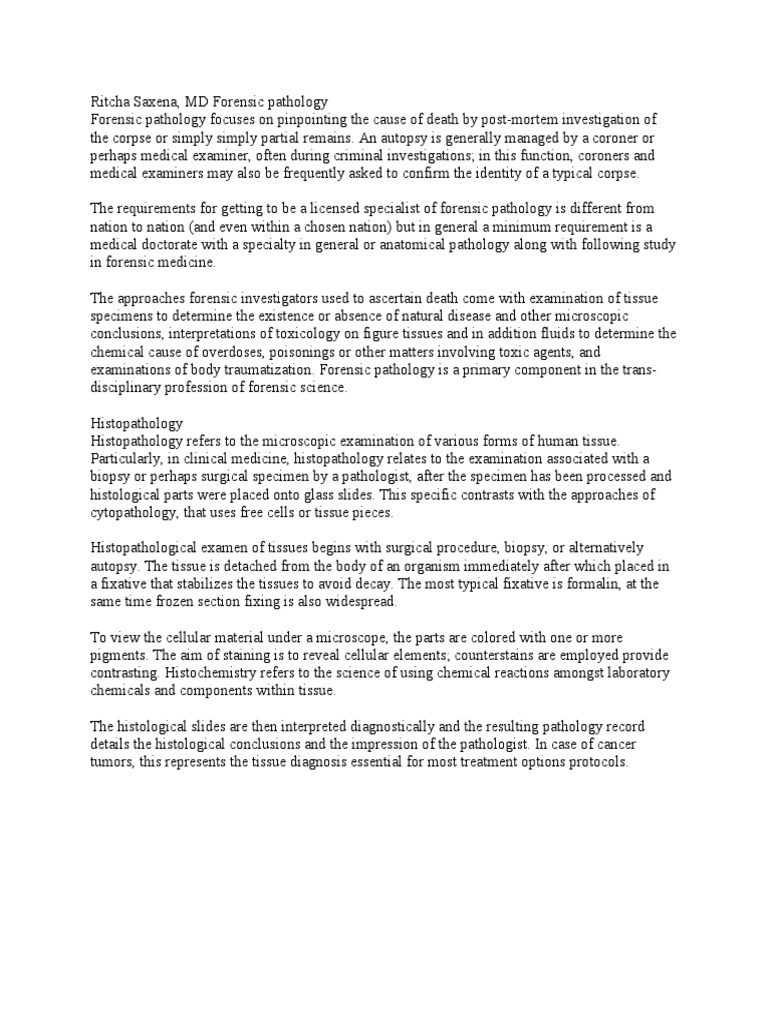Anatomical pathology, a cornerstone of modern medicine, delves into the macroscopic and microscopic examination of tissues and organs to diagnose disease. But what happens when we consider the potential impact and contributions of a specific practitioner, in this case, Dr. Ritcha Saxena MD, within this expansive field? Can we truly distill the essence of their influence through the lens of their work?
This exploration presents a unique challenge: to paint a comprehensive picture of a pathologist’s impact without the typical biographical details. It requires us to infer, to deduce, and to appreciate the ripple effects of meticulous diagnosis and informed medical decision-making. We must consider the scope of anatomical pathology itself.
I. The Breadth of Anatomical Pathology
Anatomical pathology encompasses a vast array of subspecialties, each demanding a specific skillset and knowledge base. The following offer a glimpse into this intricate field:
A. Surgical Pathology: This is the diagnostic evaluation of tissue specimens removed during surgery. These specimens range from small biopsies to entire organs. Pathologists analyze these samples to confirm diagnoses, determine the extent of disease, and guide treatment strategies. The meticulous evaluation requires an acute understanding of morphologic variations and a keen eye for subtle abnormalities.
B. Cytopathology: This subspecialty focuses on the examination of individual cells or small clusters of cells obtained from various body sites. Common techniques include Pap smears for cervical cancer screening, fine needle aspiration (FNA) of masses, and fluid analysis from pleural or peritoneal cavities. Cytopathology provides rapid diagnostic information, often guiding clinical management decisions in real-time.
C. Autopsy Pathology (Forensic Pathology): An autopsy, or post-mortem examination, is the systematic dissection and examination of a deceased individual to determine the cause and manner of death. Autopsy pathology is crucial for understanding disease processes, identifying public health threats, and providing closure to grieving families. Forensic pathology, a subset of autopsy pathology, specifically addresses deaths that are sudden, unexpected, or violent, often involving legal investigations.
D. Molecular Pathology: Integrating molecular biology techniques into diagnostic pathology, this rapidly evolving field analyzes DNA, RNA, and proteins to identify specific genetic mutations, infectious agents, or other molecular markers of disease. Molecular pathology plays a pivotal role in personalized medicine, tailoring treatment strategies based on an individual’s unique molecular profile.
II. The Role of the Pathologist: A Diagnostic Arbiter
Pathologists are, in essence, the diagnostic arbiters of medicine. They provide critical information that informs clinical decisions across a wide range of medical specialties. Their role extends beyond simply identifying disease; it involves characterizing its behavior, predicting its prognosis, and guiding therapeutic interventions.
A. Diagnostic Accuracy: The cornerstone of a pathologist’s contribution is their ability to render accurate and timely diagnoses. This requires not only extensive knowledge of disease processes but also meticulous attention to detail and the ability to integrate clinical information with microscopic findings. Erroneous diagnoses can have devastating consequences, highlighting the critical importance of precision and expertise.
B. Prognostic Information: Beyond diagnosis, pathologists provide crucial prognostic information that helps clinicians predict the course of a disease and tailor treatment strategies accordingly. This may involve assessing the grade and stage of a tumor, identifying specific molecular markers, or evaluating the response to therapy.
C. Quality Assurance: Pathologists play a vital role in ensuring the quality of laboratory testing and maintaining accreditation standards. This includes implementing quality control measures, participating in proficiency testing programs, and continuously monitoring laboratory performance.
III. Dr. Saxena’s Potential Contributions: Inferring Impact
Considering Dr. Ritcha Saxena’s specialization in Forensic Pathology, we can infer a significant contribution to both the medical and legal communities. Her work, specifically concerning medico-legal investigations, serves as a critical nexus between medical science and justice.
A. Medicolegal Investigations: Forensic pathologists determine cause and manner of death in cases involving suspicious or unexplained circumstances. The meticulous examination of the deceased, combined with scene investigation and toxicological analysis, provides critical evidence for legal proceedings.
B. Expert Testimony: Forensic pathologists often provide expert testimony in court, explaining their findings to judges and juries. This requires not only a deep understanding of pathology but also the ability to communicate complex scientific information in a clear and understandable manner. Accurate and compelling testimony can be pivotal in determining the outcome of legal cases.
C. Research and Education: Contributions may also include involvement in research to improve forensic pathology techniques, teaching medical students and residents, and publishing scholarly articles. This perpetuates the advancement of knowledge and helps train the next generation of forensic pathologists.
IV. The Impact on Patient Care and Public Health
While the direct impact of a forensic pathologist is not on living patients, their work has profound implications for public health and safety. Accurate determination of cause of death can identify infectious disease outbreaks, uncover environmental hazards, and prevent future deaths.
A. Identifying Public Health Threats: Autopsies can reveal previously undiagnosed infectious diseases, such as tuberculosis or influenza, alerting public health officials to potential outbreaks.
B. Preventing Future Deaths: By identifying risk factors for sudden death, such as undiagnosed heart conditions or drug overdoses, pathologists can help prevent future deaths through targeted interventions and public health campaigns.
C. Advancing Medical Knowledge: Autopsy findings can contribute to our understanding of disease processes, leading to improved diagnostic and treatment strategies for living patients.
In conclusion, while a comprehensive assessment requires specific details, we can appreciate the profound and multifaceted contributions a pathologist like Dr. Ritcha Saxena makes to healthcare, the legal system, and society as a whole. Their meticulous diagnostic skills, expertise in medicolegal investigations, and commitment to education and research ultimately contribute to improved patient care, public safety, and the advancement of medical knowledge.










Leave a Comment